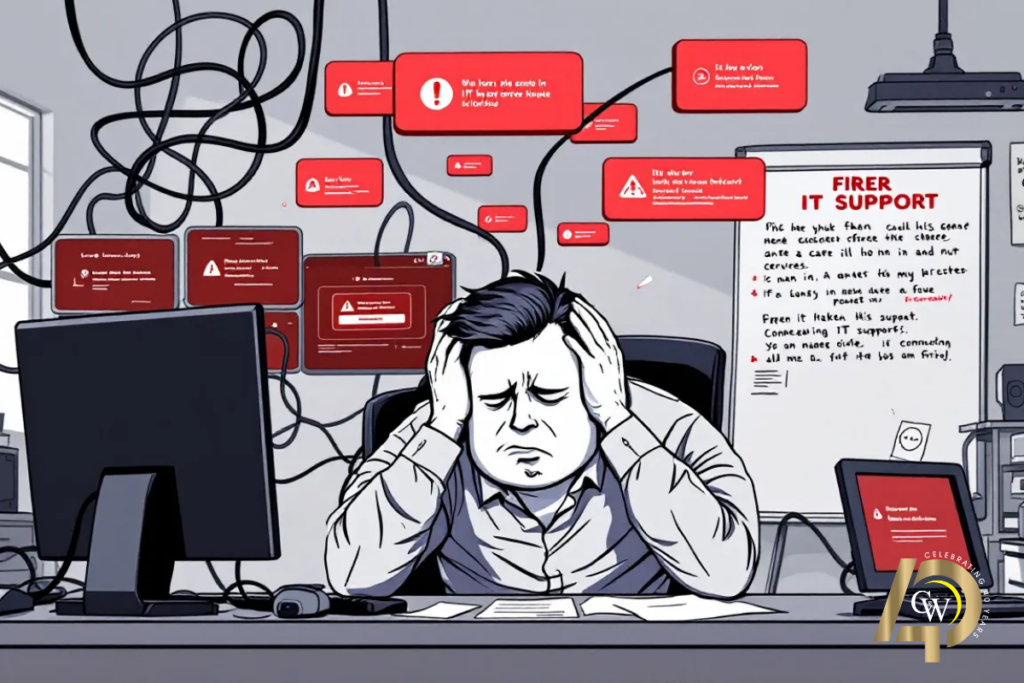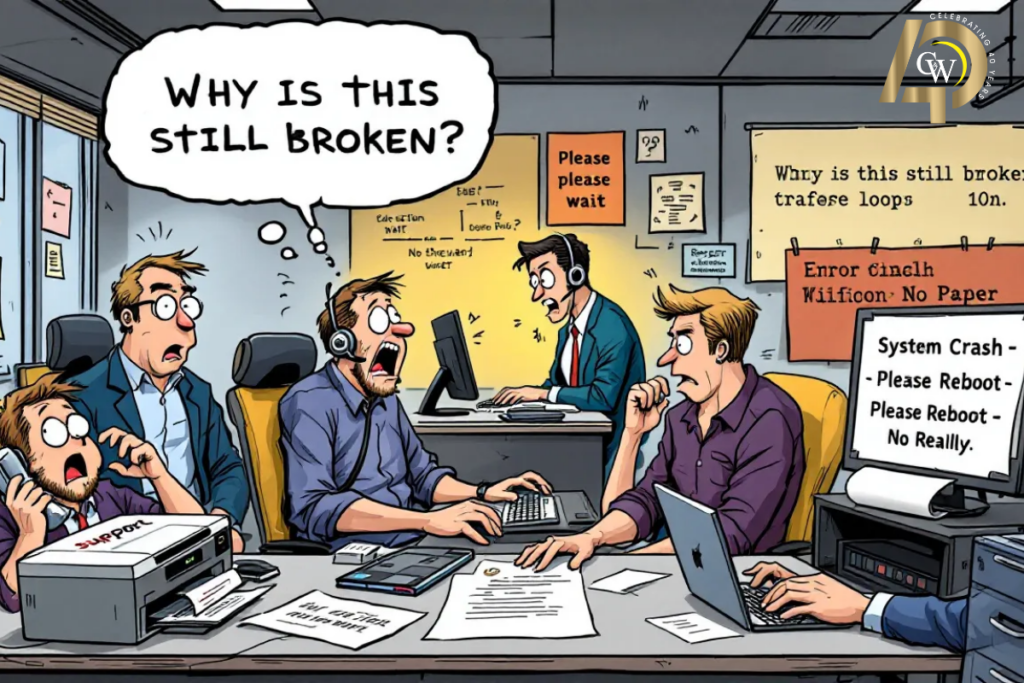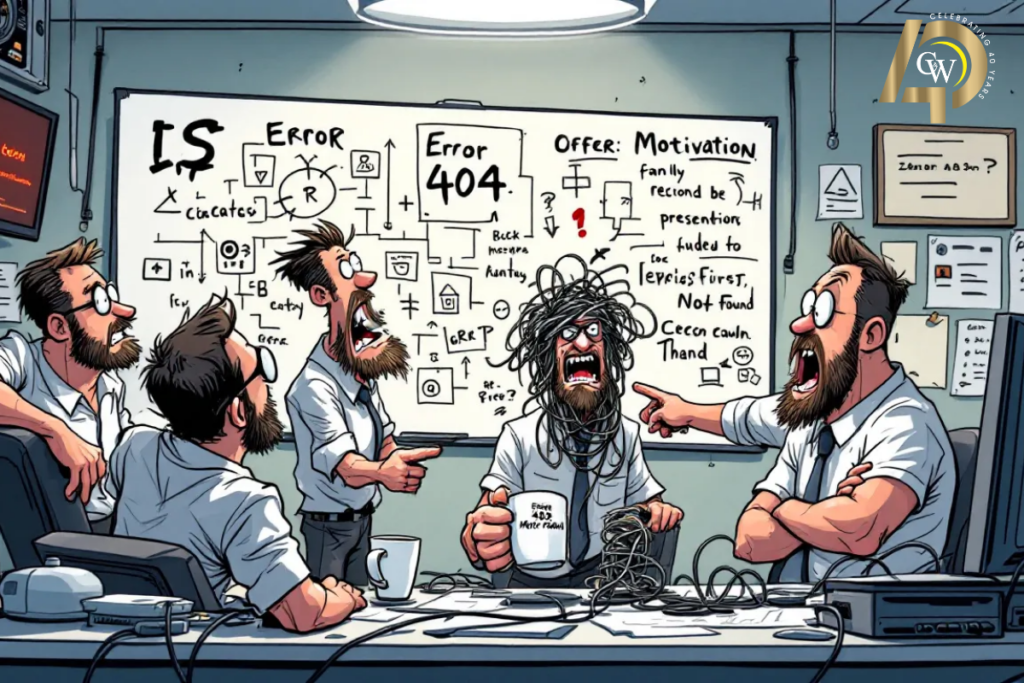Why Inconsistent IT Support Quality Leads to Major IT Failures

How do inconsistent IT support and major IT failures connect? Inconsistent IT support can lead to major disruptions and security risks that ripple across an entire organization. This article will show you why consistent IT support is vital for preventing significant IT failures, safeguarding your data, and maintaining seamless business operations. We will also explore practical strategies to ensure your IT systems run smoothly, meet customer expectations, and uphold your brand’s reputation in today’s competitive market.
Key Takeaways
Inconsistent IT support leads to chaos and uncertainty within organizations, resulting in lost productivity and employee frustration.
The quality of IT support varies widely, undermining trust in the IT department and potentially resulting in major IT failures.
A proactive and consistent IT support strategy fosters employee confidence, enhances productivity, and protects against insider threats and data breaches.
Why Inconsistent IT Support Quality Leads to Major IT Failures
Technology is the engine of modern business. When it runs smoothly, it powers productivity, innovation, and growth. But when it sputters and stalls, the entire operation can grind to a halt. The difference between a well-oiled machine and a system on the brink of collapse often comes down to the quality and consistency of your IT support. Many companies experience a rollercoaster of service—one day, an issue is resolved in minutes; the next, a critical problem lingers for days, met with confusing advice or, even worse, silence. This unpredictability does more than just cause minor headaches; it creates a foundation of instability that can lead to significant IT failures, disrupting workflows, frustrating employees, and leaving your business vulnerable.
When IT support is inconsistent, it creates a sense of chaos within the organization. Employees never know what to expect when they encounter a problem. This uncertainty can lead to missed deadlines, stalled projects, and a general sense of frustration among the team. Imagine preparing for a major client presentation, only to have your laptop refuse to connect to the company network. You submit a support ticket, hoping for a swift resolution, but instead, you wait for hours, only to receive a generic, unhelpful response. The opportunity is lost, and morale takes a hit.
Moreover, the quality of IT support can feel like a lottery. One technician might be knowledgeable, patient, and efficient, while the next interaction could be with someone who seems disinterested or lacks the necessary expertise. This inconsistency makes it impossible for employees to know what to expect, undermining the reputation of the entire IT department or service provider. Ultimately, this erosion of trust and reliability can lead to major IT failures that disrupt the entire organization.
The Frustration of Inconsistent IT Support
Imagine this scenario: a key employee is preparing for a major client presentation, but their laptop suddenly refuses to connect to the company network. They submit a support ticket, hoping for a swift resolution. Instead, they wait. And wait. Hours turn into a full day, and the response they finally receive is a generic, unhelpful article that doesn’t address their specific issue or the customer’s situation. The presentation is missed, a potential opportunity is lost, and the employee’s morale plummets. This is not an isolated incident; it’s a familiar story for businesses wrestling with a major outage and unreliable IT support, as highlighted in recent reports.
The frustration is multi-layered. First, there’s the immediate disruption to productivity. When technology fails, work stops. Deadlines are jeopardized, projects are delayed, and the momentum your team has built comes to a screeching halt. Each moment an employee spends trying to troubleshoot an issue themselves or waiting for a response time is a moment they aren’t contributing to core business objectives. This lost time accumulates, creating a significant drag on overall efficiency and output, leading to widespread disruptions. It becomes a hidden cost, silently eroding your bottom line due to a software bug.
Beyond lost productivity, inconsistent support breeds a pervasive sense of uncertainty among your staff. Employees begin to lose confidence in the very systems they rely on to do their jobs. Will their computer work today? If they encounter a problem, will they get the help they need? This doubt creates a stressful work environment. Instead of focusing on their roles, team members become part-time, unwilling IT troubleshooters, wasting valuable mental energy on problems they are not equipped to solve.
This uncertainty also stifles innovation and adoption of new tools. If the support for existing technology is patchy, why would anyone feel confident embracing a new software or system? The fear of being left without adequate help becomes a barrier to progress. Your organization might invest in powerful new technologies designed to streamline operations or enhance collaboration. The importance of an IT partner should be talked about in businesses.
The Desire for Consistent, High-Quality IT Services
Every business leader, manager, and employee shares a common and fundamental desire: for technology to simply work. When it doesn’t, they want the assurance that a reliable, effective, and predictable support system is in place to resolve the issue promptly. This isn’t a wish for a perfect, error-free world; it’s a practical need for ensuring consistent consistency. Deliver consistent, high-quality IT service is the bedrock upon which a productive, secure, and forward-thinking organization is built.
An ideal IT support experience begins with predictability and includes:
A clear, straightforward process for employees to seek help when an issue arises.
Confidence that their request will be acknowledged quickly.
Assignment of the request to a capable technician.
Resolution of the issue within a reasonable and communicated timeframe.
This predictability eliminates anxiety and uncertainty caused by inconsistent service, replacing the feeling of “I hope someone can help” with the assurance of “I know I will get the help I need” through consistent customer service.
High-quality service is also defined by competence and clarity. A great IT support professional:
Listens carefully to understand the user’s issue
Explains the steps they are taking in plain language
Confirms that the resolution has fully solved the problem, ensuring exceptional service and high-quality customer service standards, as well as service quality.
This level of service builds customer trust and empowers employees. They feel heard, respected, and valued, which reinforces their confidence in the organization’s support structures. Instead of feeling like they are interrupting someone, they feel like they are collaborating with an expert partner at the same level.
Moreover, consistent IT support is proactive, not just reactive. A truly valuable IT partner:
Doesn’t just wait for things to break
Actively monitors systems to identify potential problems before they impact users
Manages updates, patches, and maintenance behind the scenes
Ensures the technology infrastructure remains secure, stable, and optimized
This proactive approach prevents many of the common IT failures that disrupt the workday, creating a seamless and nearly invisible support system that allows employees to focus entirely on their efficient service.
This desire for consistency extends to strategic alignment. Businesses want an IT partner who understands their goals and challenges. They want guidance on how technology can be leveraged to drive growth, improve efficiency, and gain a competitive edge. A high-quality IT service provider acts as a strategic advisor, helping leadership make informed decisions about technology investments. They don’t just fix today’s problems; they help you prepare for tomorrow’s opportunities.
This partnership transforms IT from a cost center into a strategic asset that actively contributes to the company’s success. Ultimately, the desire is for a technology environment where the support is so reliable and effective that employees rarely have to think about it. It’s a vision of technology as a true enabler, a powerful tool that works consistently to help people and the business succeed.
The Fear: Data Breaches from Insider Threats
While the frustrations of unreliable IT support are tangible daily disruptions, a deeper and more significant fear lurks beneath the surface: the risk of a catastrophic data breach. Inconsistent IT management and support don’t just impact productivity; they create vulnerabilities that can be exploited. One of the most insidious of these is the insider threat—a risk that comes not from a shadowy external hacker, but from within the organization’s own walls.
An insider threat isn’t always malicious. In fact, most often it is unintentional, born from a lack of awareness or proper training. An employee who hasn’t been adequately educated on cybersecurity best practices might:
Accidentally click a phishing link
Download a compromised file
Use a weak, easily guessable password for a critical system These simple mistakes can open a door for cybercriminals to walk right into your network. When IT support is inconsistent, the crucial educational component that builds a security-conscious culture often falls by the wayside.
Inconsistent enforcement of security policies is another major contributor to this fear. If one IT technician insists on multi-factor authentication and strong password protocols, but another lets standards slide for the sake of a quick fix, it sends a mixed message to employees. They begin to see security measures as optional hurdles rather than essential protections. This laxity can spread throughout the organization, creating a culture of complacency where security is viewed as an inconvenience. In such an environment, the risk of an accidental breach skyrocket.
Moreover, inconsistent support can lead to delays in identifying and responding to threats. A well-functioning IT team has robust monitoring systems in place to detect unusual activity, such as an employee accessing sensitive files they don’t need for their job or data being exfiltrated from the network. When support is fragmented or overwhelmed, these alerts may be missed or ignored. The window of opportunity for an attacker to access, steal, or encrypt your company’s most valuable data widens with every moment of inaction.
There is also the risk posed by disgruntled employees. An employee who feels consistently frustrated by poor IT support, or who has had negative interactions with the IT team, may become careless with company data and equipment. In a worst-case scenario, a malicious insider might exploit the known weaknesses in the IT system—weaknesses they are aware of precisely because of the inconsistent support to intentionally cause harm. They might steal intellectual property, delete critical files, or sell credentials on the dark web.
The fallout from such an event can be devastating, leading to financial loss, brand reputation damage, and legal consequences. The fear of an insider-driven data breach is a rational response to the chaos of inconsistent IT support. It recognizes that your employees are your first line of defense, but without consistent guidance, training, and enforcement of security policies, they can unknowingly become your greatest liability.
Protecting your business requires more than just firewalls and antivirus software; it requires building a resilient human firewall through consistent and proactive IT management.
Tech Tip Solution: Conduct Regular Cybersecurity Training for Employees
The most effective strategy to counter the threat of unintentional insider breaches is to transform your employees from potential liabilities into your strongest security assets. This is achieved through consistent, engaging, and comprehensive cybersecurity training for new employees. A one-time orientation session is not enough; security awareness must be cultivated as an ongoing part of your company culture.
Start by establishing a regular training schedule:
Conduct quarterly or bi-annual sessions to keep security top-of-mind.
Use these sessions to address the latest threats and tactics used by cybercriminals.
Make these training sessions mandatory for all employees, from the C-suite to the front lines, because a security vulnerability can emerge from any level of the organization.
The content of the training should be practical and relevant to your employees’ daily work. Focus on the most common threats they are likely to encounter. Phishing awareness is crucial: teach them how to identify suspicious emails by pointing out red flags such as:
Generic greetings
Urgent requests
Grammatical errors
Links that lead to unfamiliar websites.
Password hygiene is another critical area. Key points include:
The importance of creating strong, unique passwords for every application.
The concept of passphrases as an alternative to traditional passwords.
Advocating for the use of a password manager to securely store complex credentials.
Emphasizing the critical role of multi-factor authentication (MFA) as a non-negotiable layer of security.
Finally, data handling should be addressed: clearly define what constitutes sensitive company data and provide clear guidelines on how it should be stored, shared, and disposed of. This is especially important for remote and hybrid teams.
Summary
In summary, mastering remote workforce management involves understanding its benefits and challenges, implementing best practices, and utilizing essential tools. Remote work offers increased productivity, cost savings, and access to a global talent pool. However, it also presents challenges such as communication barriers, building team culture, and ensuring productivity,. By adopting effective strategies and leveraging remote workforce management software, businesses can manage remote employees effectively and create a supportive, productive work environment.
As remote work continues to evolve, staying adaptable and data-driven is crucial. By prioritizing work-life balance, fostering trust and transparency, and investing in employee development, businesses can lead their remote teams to success. Embrace the future of work and unlock the full potential of your remote workforce.
About C&W Technologies
C&W Technologies is a leading technology company that specializes in delivering innovative software solutions for businesses and consumers. We are committed to providing high-quality products that help our customers streamline their processes, increase efficiency, and improve overall performance. Our team of skilled professionals has a deep understanding of the latest technologies and constantly strives to stay ahead of trends and advancements in the industry. With years of experience under our belt, we have successfully delivered cutting-edge solutions to clients from various industries. At C&W Technologies, we prioritize building strong relationships with our clients, as we believe that trust and communication are key to delivering successful projects. Let us help you with your IT cost savings today by contacting us!
Contact Us Today!
If you are looking for a reliable and innovative technology partner, look no further than C&W Technologies. Contact us today to learn more about our services and how we can help you achieve your goals.
Frequently Asked Questions
How does inconsistent IT support impact employee productivity?
Inconsistent IT support significantly hinders employee productivity by causing frequent disruptions and forcing them to waste time troubleshooting issues or waiting for help. This ultimately results in reduced efficiency and output across the organization.
What are the main frustrations that employees face due to inconsistent IT support?
Inconsistent IT support leads to immediate disruptions in productivity and a loss of confidence in systems, causing stress for employees who feel they must troubleshoot issues instead of focusing on their primary tasks. This ultimately hampers overall work efficiency and satisfaction.
Why is consistent and high-quality IT support crucial for a business?
Consistent and high-quality IT support is crucial because it fosters employee trust, ensures reliable assistance, and aligns technology with business goals. This transforms IT into a strategic asset rather than just a cost center.
What are insider threats, and how do they relate to inconsistent IT support?
Insider threats arise from both unintended actions and deliberate malice, often linked to inadequate cybersecurity awareness or inconsistent enforcement of security policies. Inconsistent IT support exacerbates this issue by neglecting proper training and allowing security vulnerabilities to emerge.
How can regular cybersecurity training help mitigate the risk of data breaches?
Regular cybersecurity training significantly mitigates the risk of data breaches by equipping employees with the knowledge needed to recognize threats like phishing and practice safe behaviors online. This proactive approach fosters a security-conscious culture that minimizes insider-driven risks.




